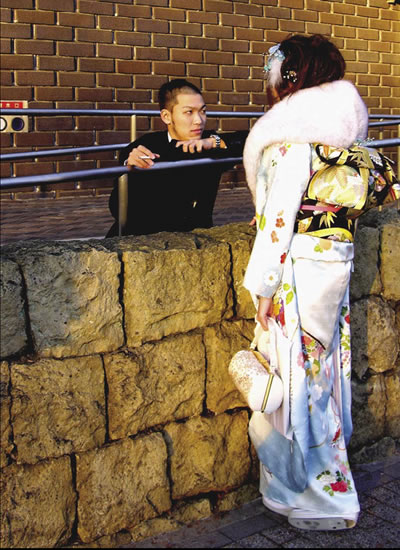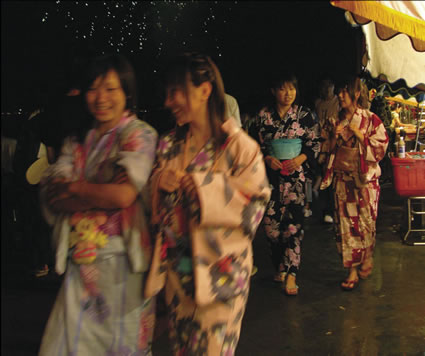|
Adjusting to Living in a New Culture
An English Teaching Assistant's Introduction to Japan
Article and Photos by Gabrielle Wallace

|
|
Two 20- year-olds in Kyoto flirt during the annual celebration of Coming of Age Day (seijin no hi), the day they officially become considered adults.
|
The December before I graduated from The University of Southern Maine, I was knee-deep in Spanish classes for my minor, working part-time as a typing instructor, living with my parents and dealing with a breakup with my
ex-boyfriend. I had a lot going on and didn’t have a clue what to do next after graduation. All I knew is I needed a big change. I knew I wanted to travel but lacked a purpose. Never in a million years did I think that nine months later
I would end up with a purpose and a destination — to teach English in Kakamigahara, Japan.
I had no interest in Japan until my last year of college. Even then, it was a diversion from my bigger passion, my major in international relations. For most of my time at school, I had focused on Latin America. I could
find Tokyo on a map but had no business on the eastern half of the world yet. However, by my last year in school I had taken all of the courses offered in that area and decided to try something new. My university has a special exchange relationship
with Rissho University in Japan. Every summer a group of Japanese college students come to visit my university. As my first experience with people from Japan, I participated in the exchange and hosted a group of 22 Japanese college students along
with a group of about 20 other Americans. Together we learned about each other’s cultures, albeit through broken English. I wanted to be able to communicate better with my new Japanese friends. The following winter, I took a beginning Japanese
course. During that course, my professor, Higgins Sensei, mentioned the JET Program. On a whim, I filled out and sent an application. The Rissho University students and Higgins
Sensei propelled me into the JET application process, and it took me all the way to a small town in central Japan.
Culture shock set in shortly after arriving. There was nothing in my international relations major that had prepared me for living and working in Japan. The work culture was different than I was used to in the United States.
At the start of my assignment as an assistant English teacher, all the staff were invited to the beginning-of-the-year party or enkai.
I wrote in my journal, “For the last few weeks I had been dreading the thought of being whisked away by bus to a random hotel in Gifu City accompanied by 60 co-workers, the main activity being to get drunk together.
Only about three of the teachers speak enough English for me to communicate with them. And as for my Japanese, I've built up to ‘Where is the train station?’ and ‘This is delicious!’”

|
|
Young women dressed in festive yukata enjoy the fireworks and socializing at the annual Hanabi Festival in Gifu, Japan.
|
Despite my apprehension and cluelessness about Japanese language and culture, I had a great time with my coworkers at our enkai. I was pleasantly surprised, if not caught off guard by the work culture differences. It was
nothing like the boring company luncheons I had attended in the past. First of all, the food kept coming in amazing little courses of authentic Japanese dishes. Second, pouring a beer for the principal of the school is an honorable task in Japan.
I liked the Japanese custom that no one should ever pour his or her own drink. In fact, people are so eager to please one another and so averse to politely refusing that many people end up drinking a lot of Kirin beer. At the school office, many
of my co-workers were hard to get to know. But at the enkai, I learned a lot about them and improved my cache of Japanese phrases.
During the enkai a co-worker asked if I liked to sing. People were always asking me strange questions, so I didn’t think much of it and said yes. He replied, to my surprise, “Good! Then you will sing
karaoke now!” I was ushered up to the front of the function room, a microphone placed in my hand, and with a dry mouth and sweaty hands I did my best rendition of "Yesterday" accompanied by my supervisor, Ota Sensei. Everyone
in the room knew the words and began clapping with the melodic beat. The enkai felt so far removed from reality, that is to say, it was so far removed from my American reality, it seemed like a strange dream.
Just like “Yesterday,” my year in Japan passed quickly. It was filled with great moments and more surprises than I can recount. Living in Japan introduced me to another culture’s way of life — cuisine,
religion, music, national holidays, and last but not least, work-related parties of the kind I would never have expected.
If the idea of going to live in Japan, working as an assistant English teacher, and having experiences you never expected interests you, I encourage you to apply to the JET Program. Teaching English in Japan is not only
about memorable parties with your co-workers, however, and you should consider thoroughly preparing yourself for the unexpected.
If you are thinking of applying to the JET Program, I recommend you first do the following:
► Take a Japanese language class. I found it difficult to learn Japanese, but you will progress much further in your ability once
immersed in Japan if you start studying grammar and vocabulary ahead of time.
► Read books about Japan and books by Japanese authors. This will help introduce you to the Japanese mindset and culture.
► Seek out Japanese friends in your community and people who have taught English in Japan in the past. Chances are you have a friend
of a friend who has taught English abroad, even in Japan.
Gabrielle Wallace lived and worked in a small town in Japan, Kakamigahara, and worked as an assistant English teacher through the JET Program.
|
